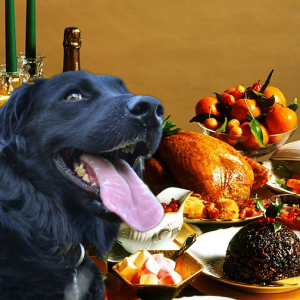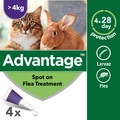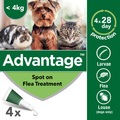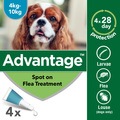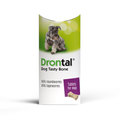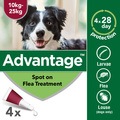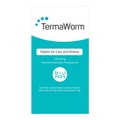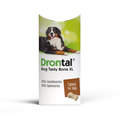At christmas time we are all guilty of a bit of festive indulgence and wanting to spoil our pets is only natural. Whilst the odd treat here and there is harmless, it is worth being mindful of the human foods that can be fatal to dogs and cats so we know what to avoid feeding them, particularly at Christmas when these are often disguised in seasonal treats.
Everyone knows that dogs cannot eat chocolate; however lesser known toxic foods such as grapes and certain types of vegetable can pose a greater risk to our canine friends than we might realise.
Whilst being completely safe for us, various substances can play havoc with a dog’s digestive system and cause discomfort and, in many cases, complete deterioration and death. Seeing our pets suffer is distressing, so ensuring they only consume foods that are safe for them is a number one priority, whatever the time of year.
This becomes harder to oversee around Christmas time when many harmful ingredients make their way into seasonal treats. The temptation to indulge our pets with scraps of human foods is also greater during the festive period, as is the potential for accidental poisoning.
We have compiled a list of dangerous ingredients that you should avoid feeding your dogs and cats, as well as what Christmas foods they might be found in.
- Grapes and raisins (no matter the quantity) can be incredibly harmful to both dogs and cats. This is because they contain a potent toxin that can damage the liver and kidneys in next to no time, even if immediate veterinary assistance is sought. Raisins are a key ingredient in mince pies and fruit cake, so make sure these are kept well away from your dog or cat – leaving them unpackaged on a worktop is asking for trouble, as most pets will find a way to access them.
- Nuts, especially macadamia nuts, are also dangerous to our pets when consumed. A toxin present in macadamia nuts can impede the function of a dog’s digestive, muscle and nervous systems, resulting in weakness, breathlessness, tremors and swollen legs. Nuts can also be found in fruit cake and are a popular festive nibble, so always ensure these are kept out of reach of pets.
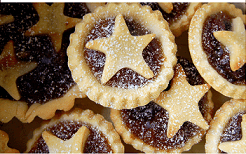
- Chocolate is a notoriously bad food for dogs, although it is usually not fatal if consumed in small quantities. This entirely depends on your dog’s individual response to chocolate and whether they have consumed the dark, milk or white variety. Dark chocolate contains the highest concentration of cocoa and is therefore far more harmful to canines. If ingested, chocolate can cause seizures and vomiting, as well as increased heart rate which can in turn prove fatal. Although many people will spend the year being vigilant about their dogs coming into contact with chocolate, at Christmas time it is easy to become more lapse, forgetting to conceal any and every suggestion of chocolate in the house. Chocolate advent calendars pose a particular hazard as dogs and cats can easily open their doors and devour what’s inside. Make sure these are kept in a safe place where they cannot be accessed by inquisitive animals.
- Nutmeg is a spice commonly used at Christmas, whether in cakes, hot drinks, preserves or soups. Many people also choose to baste their Christmas poultry with it, which is often offered up as scraps to the dog after dinner. If a dog consumes too much nutmeg, its nervous system will begin to suffer the potentially severe consequences. Highly toxic to canines, this spice is to be avoided and kept out of reach of all pets.
- Onions and garlic, whatever their form (raw, cooked or powdered), are very dangerous to cats and dogs, even if a minimal amount is ingested. A component present in both foods is responsible for destroying a dog’s red blood cells, a serious condition that can lead to anaemia. Various symptoms signal an anaemic dog, such as breathlessness, listlessness, vomiting and general disinterest in life. Onions and garlic are popular seasoning ingredients found in all manner of foods and are likely to feature in meals over the Christmas period. Stuffing contains both, so make sure your cat or dog is kept away from it. Garlic is also found in a number of commercial dog foods and treats, and many claim it actually has beneficial properties when administered in small amounts. Again, it all depends on how your dog reacts to it and it is sometimes better to veer on the side of caution.
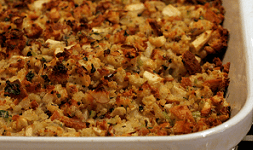
- Xylitol is a sweetener found in a number of foods likely to appear at Christmas. These include sugared sweets and candy, some dietary foods and baked goods. The amounts of Xylitol found in human foods would be enough to cause problems in dogs, including dropping blood sugar levels, seizures and liver collapse, although in products specifically formulated for dogs, small amounts of Xylitol can be present without causing any issues. This is because they are present in very small quantities - too small to be toxic.
- Although it is unlikely any responsible pet owner would allow their animal to consume alcohol (even if it is just a taste of celebratory champagne from your glass) or drinks containing caffeine (tea, coffee, energy drinks), there have been many cases of this type of poisoning seen in dogs over the festive period. Alcohol has a far stronger effect on dogs than humans, and even a drop of it or any other stimulant-type drink can cause disorientation and laboured breathing, while too much can result in death. Sometimes it is not even intentional, and dogs have been known to lap up spilled alcohol from the floor or table surfaces when unobserved. If you are planning a party this December, always ensure your guests understand what foods are safe and unsafe for your pets and discourage anyone from feeding them without your knowledge. Keep alcohol away from your animals and if some gets spilled, make sure it is not your dog that is cleaning it up.
- Whilst not a food, meat string is very dangerous to cats and dogs and is easily disguised, so be particularly aware of this before, during and after dinner time.
Various other foods have been labelled harmful for pets, although the jury is still out on many of them. Like humans, dogs and cats react differently to foods, with some suffering greater degrees of intolerance or allergic response than others. Most people prefer to adopt the attitude ‘better safe than sorry’ and try to avoid the following foods where possible. Usually, the majority of human foods are suitable for our pets if given rarely, and in very small quantities.
- Avocado contains Persin, a potentially harmful substance than can cause problems for dogs if they consume too much of it.
- Corn cobs have been known to kill dogs, not necessarily because of anything they contain but because the kernels get lodged in a dog’s throat or intestine, usually requiring induced vomiting or surgery to remove them. Many dog owners report the health benefits of corn for their pets and how much they enjoy them so, again, the verdict on this particular food is unclear.
- Peaches, plums and persimmons in large quantities have been known to cause digestive complaints in dogs and inflammation of the small intestine. The pips of these fruits are far more dangerous than the fruits themselves, not only because they are relatively large and therefore pose a choking hazard, but because of the toxins they contain.
- Rhubarb and tomato leaves contain oxalates that may have a damaging effect on a dog’s digestive, urinary and nervous systems. Avoid such problems by refraining from feeding these products to your pets.
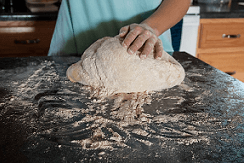
- Bread dough needs to rise when it is baked and it will do so whether in an oven or your pet’s digestive tract. Keep any fresh dough away from your animals and if they consume any, seek immediate veterinary advice.
- Some dairy products have been associated with digestive problems in pets, such as milk and cheese. While kittens are perfectly capable of digesting milk, adult cats struggle to and will usually experience diarrhoea or some form of digestive upset if given a large amount of it. Some would argue with this point, as many pet owners are encouraged to feed dairy products such as yogurt to their dogs in order to build up healthy bacteria in the gut.
- Salt is problematic (as it is to humans) if too much is consumed and can cause excessive urination and thirst in both dogs and cats. Feeding your pets specially formulated diets is your best bet, as these are developed with the needs of your animals in mind.
In order to ensure a happy and healthy Christmas is had by all, taking care of what your beloved pets are eating over the festive period and ignoring the temptation to indulge them with potentially harmful human foods, is a sure-fire way of guaranteeing they make a bouncing entry into 2021 without any unpleasantries.
Written by: Hannah
